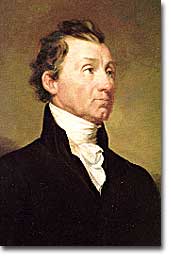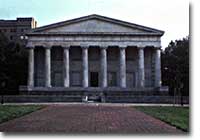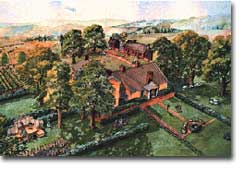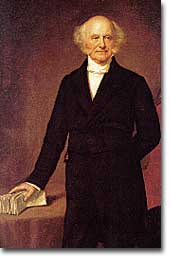23a. The Era of Good Feelings and the Two-Party System

James Monroe's Administration did not recognize the new republics in South America until 1822. Monroe wanted to wait until after Spain had ceded Florida to the U.S.
The War of 1812 closed with the Federalist Party all but destroyed. The 1816 presidential election was the last one when the Federalists' ran a candidate. He lost resoundingly.
The 1818 Congressional election brought another landslide victory for Democratic-Republicans who controlled 85 percent of the seats in the U.S. Congress. James Monroe, yet another Virginian, followed Madison in the Presidency for two terms from 1817 to 1825. Although this period has often been called the Era of Good Feelings due to its one-party dominance, in fact, Democratic-Republicans were deeply divided internally and a new political system was about to be created from the old Republican-Federalist competition that had been known as the First Party System.
Although Democratic-Republicans were now the only active national party, its leaders incorporated major economic policies that had been favored by Federalists since the time of Alexander Hamilton. President Monroe continued the policies begun by Madison at the end of his presidency to build an American System of national economic development. These policies had three basic aspects: a national bank, protective tariffs to support American manufactures, and federally-funded internal improvements.

The Second Bank of the United States was established after the War of 1812. Andrew Jackson did not renew the Bank's charter in 1836. It currently serves as a portrait gallery for Independence National Park in Philadelphia.
The first two elements received strong support after the War of 1812. The chartering of the Second Bank of the United States in 1816, once again headquartered in Philadelphia, indicates how much of the old Federalist economic agenda the Democratic-Republicans now supported. Whereas Jefferson had seen a national bank as a threat to ordinary farmers, the leaders of his party in 1816 had come to a new understanding of the need for a strong federal role in creating the basic infrastructure of the nation.
The cooperation among national politicians that marked the one-party Era of Good Feelings lasted less than a decade. A new style of American politics took shape in the 1820s and 1830s whose key qualities have remained central to American politics up to the present. In this more modern system, political parties played the crucial role building broad and lasting coalitions among diverse groups in the American public. Furthermore, these parties represented more than the distinct interests of a single region or economic class. Most importantly, modern parties broke decisively from a political tradition favoring personal loyalty and patronage. Although long-lasting parties were totally unpredicted in the 1780s, by the 1830s they had become central to American politics.

Ash Lawn-Highland was James Monroe's estate. He originally obtained the property so he could live near his friend and mentor Thomas Jefferson.
The New York politician Martin Van Buren played a key role in the development of the Second Party System. He rose to lead the new Democratic party by breaking from the more traditional leadership of his own Democratic-Republican party. He achieved this in New York by 1821 and helped create the system on a national scale while serving in Washington D.C. as a senator and later as president.
Van Buren perceptively responded to the growing democratization of American life in the first decades of the 19th century by embracing mass public opinion. As he explained, "Those who have wrought great changes in the world never succeeded by gaining over chiefs; but always by exciting the multitude. The first is the resource of intrigue and produces only secondary results, the second is the resort of genius and transforms the face of the universe." Rather than follow a model of elite political leadership like that of the Founding Fathers, Van Buren saw "genius" in reaching out to the "multitude" of the general public.

Martin Van Buren was the first U.S. President to serve as a bachelor; his wife died before he was elected.
Like other new party leaders of the period, Van Buren made careful use of newspapers to spread the word about party positions and to ensure close discipline among party members. In fact, the growth of newspapers in the new nation was closely linked to the rise of a competitive party system. In 1775 there had been just 31 newspapers in the colonies, but by 1835 the number of papers in the nation had soared to 1200. Rather than make any claim to objective reporting, newspapers existed as propaganda vehicles for the political parties that they supported. Newspapers were especially important to the new party system because they spread information about the party platform, a carefully crafted list of policy commitments that aimed to appeal to a broad public.






